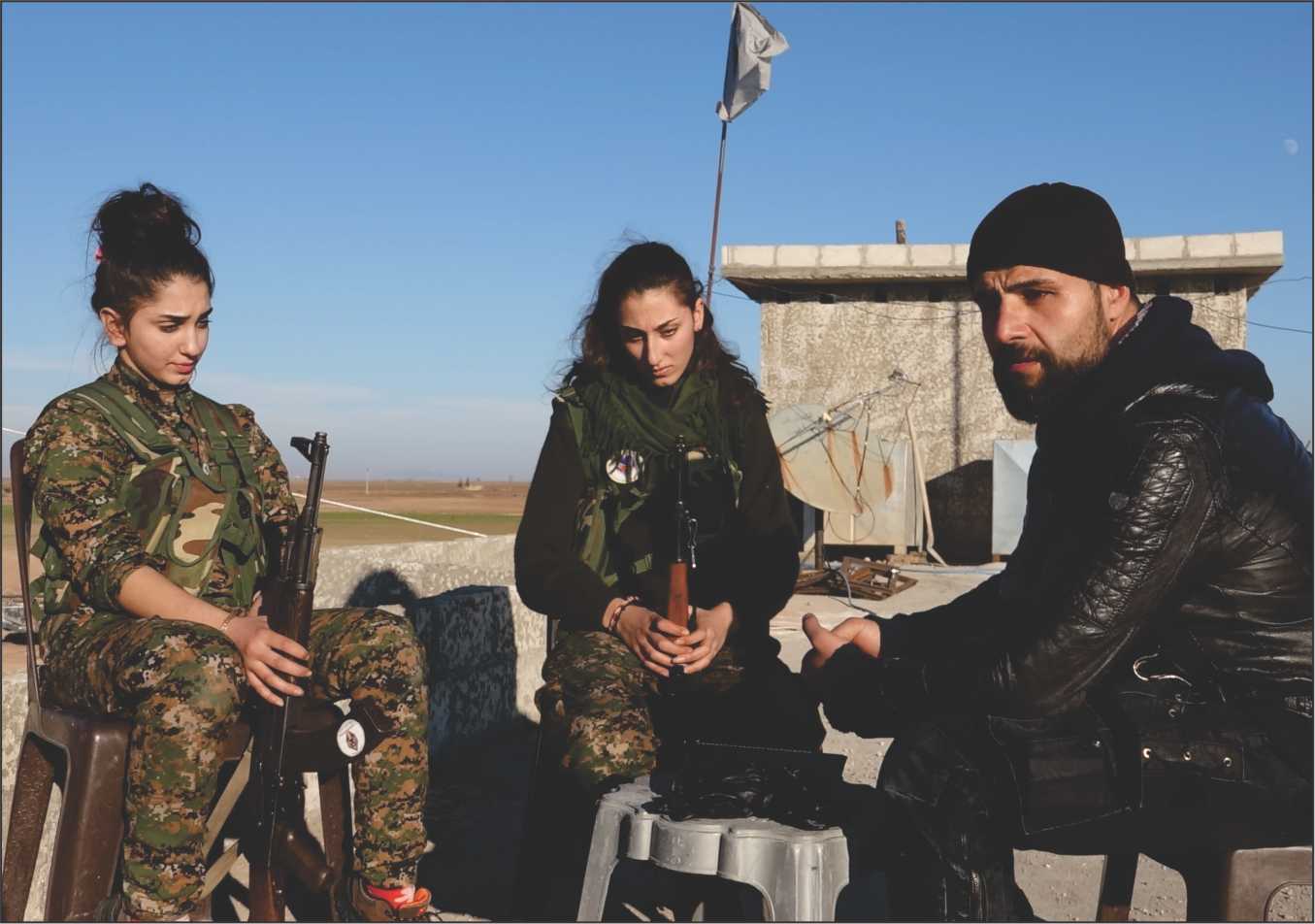Western women becoming target of Islamic State
Perhaps Islamic State of Iraq and Syria (ISIS) is the most powerful, ruthless, horrific and well-funded terrorist group in recent history but it is able to attract the imagination of a section of Western women who are ready to fight with them and falling prey to their recruitment drive.
By building an Islamist utopia theory to attract young women in the Western world, the ISIS has created a web of recruitment cells which appear and last only for one week and take a fresh birth to avoid detection by authorities.
This strategy of ISIS is somewhat working at the moment mainly due to the inability of security agencies who fail to anticipate the next move of ISIS in a digital world.
The roles women take in terrorist organizations vary, but keep in mind, militant jihadi organizations are generally male dominated, and women generally only take leadership roles over other women. In ISIS, the roles women are taking on will continue to shape the battle with this new global enemy.
Michael Steinbach, the head of the FBI’s Counter-terrorism Division announced in February of 2015 that ISIS is more aggressively recruiting women than any other terror group has.
Similarly, FBI Director James Comey, announced in July of 2015, that ISIS is using Twitter and encryption to recruit thousands of English-language followers and send out orders.
According to Comey, ISIS reaches 21,000 followers on Twitter, some that are then moved onto encrypted messaging platforms as they are pulled into the terrorist group.
Indeed, ISIS, more than any of its predecessors, is adept at using the plethora of Internet platforms available to reach digitally accessible audiences.
ISIS’s alleged goal is to build a lasting Islamist utopia, and women are essential for the creation of such a society. It is this vision of a utopia that appeals to many young Western women.
Western governments rely on intelligence and watchful policing to stop citizens from traveling to join ISIS, but the potency of targeted propaganda and the anonymous freedom of the Internet make jihad’s ideological lure difficult to combat.
The question now is what motivates the young women who are going to join one of the most misogynistic, brutal and raping organizations in the history of mankind?
Easy targets
When attempting to answer this question it is important to remember that females that join ISIS are not simply going to Iraq and Syria to surrender their sense of agency.
They, like their male counterparts, have complex motivations for taking part in terrorism, motivations that are hardly as simple as only wanting to marry a jihadi fighter. They join for multiple reasons that are as variable as the persons involved.
Female terrorists are hardly a new phenomenon. From the militant women of the Provisional Irish Republican Army in the 1970s, ’80s, and ’90s to the all-female suicide bombing units of Sri Lanka’s Tamil Tigers in the ’90s and ’00s, women have played critical roles in terrorist organizations across the globe for decades.
And while the women pledging their allegiance to ISIS are not necessarily joining their male counterparts on the battlefield, their involvement in the terrorist group is paramount: They recruit new members, helping ISIS become a bigger and deadlier force.
ISIS has recruited as many as 40,000 foreigners in the last five years, according to various estimations.
The US government estimates that about 250 Americans have tried or succeeded in getting to Syria to join ISIS in that time, and according to George Washington University’s Center for Cyber and Homeland Security, women account for approximately 13 percent of Americans charged with ISIS-related crimes.
“We are seeing a resurgence in women’s involvement in terrorist groups,” says Audrey Alexander, a research fellow at GWU. It is not a fluke-it is because ISIS wants it that way.
The group creates propaganda that specifically targets women, and sells them a different message from the one sold to men (though both are told it is their religious obligation to join the Islamic State).
Men are marketed the chance to prove their faith by joining the fight; women are marketed the idea of sisterhood and the opportunity to marry a jihadi fighter, thus supporting the cause by raising the next generation of militants.
ISIS has at least 40 media organizations pumping out video, audio, and written material, according to Humera Khan, executive director of Muflehun, a think tank specializing in counter terrorism.
But the materials intentionally skirt the more extremist side of ISIS culture. “Instead, they are talking about everyday issues, what life is like. It is very warm and fuzzy stuff,” Khan says. Only a tiny percent has anything to do with religious ideology and a tiny percent has anything to do with violence.
The ISIS caliphate is portrayed as a perfect, idyllic Islamic community. There are photos of markets teeming with vibrant fruits and vegetables, children laughing and playing games in the town square, and militants splashing around in a glittering swimming pool.
One much-circulated Twitter photo (which has since been deleted) even showed fully covered women thought to be Australians holding weapons while posing in front of a shiny, white BMW.
“There is a priority for the Islamic State to attract females because it offers stability. If you want people to see you as a nation, a legitimate state, it is important to attract females and have them start families,” says Veryan Khan, editorial director of the Terrorism Research and Analysis Consortium (TRAC). It is not like women are an afterthought. This is a strategic move.
But while women have always been valuable targets to terrorist groups, ISIS is now pursuing a chilling new strategy: recruiting teenage girls online.
Indoctrination
In October 2014, three high school girls from Denver cut class to catch a plane to Syria after chatting with ISIS supporters online.
In May 2015, Jaelyn Young, a 19-year-old former honor student and cheerleader from Mississippi, was arrested on suspicion of attempting to travel to Syria to join ISIS with her American boyfriend.
Young sent messages to FBI agents she thought were ISIS members, saying, “I cannot wait to get to Dawlah ISIS territory so I can be amongst my brothers and sisters under the protection of Allah swt to raise little Dawlah cubs In sha Allah [God willing].”
On Twitter, Instagram, Facebook, and Tumblr, users indicate their allegiance by using the moniker, Islamic State, or Dawlah (the group’s preferred names) in their private profiles.
Some feature the ISIS flag in their banner or profile picture, while others post photos dotted with the symbol. Many boast in their bios about how many times their accounts had been shut down and direct followers to alternative accounts.
After a recruiter makes initial contact, they will take the conversation to more private online platforms like Kik, WhatsApp, or, the new favorite, Telegram, an encrypted messaging app which gives senders the option to have a message self-destruct after it is read.
Recruiting efforts used to be more public but, in February last year, Twitter announced that it had suspended 125,000 ISIS-related accounts.
A few discreet public accounts located by MarieClaire.com feature links leading to the website justpasteit, where ISIS members can post propaganda that goes undetected by search engines. Users can only access the pages with an exact link.
ISIS sympathizers posting propaganda could be anywhere in the world: Syria, Iraq, or sitting in a coffee shop in the Midwest.
But for those who travel to ISIS-controlled territory, recruiting takes on an official capacity. Many of the Western women who join the Islamic State are sent to a room and given the full-time job of recruiting women just like them, explain Anne Speckhard, author of the study Brides of ISIS: The Internet Seduction of Western Females into ISIS.
When a one-on-one connection is established over an app, female recruiters then engage in a social media language that is very familiar to the women on the other end: emojis, memes, internet shorthand, and quizzes.
Women are seen as invaluable in these roles because they can relay ISIS-approved messages back to their home countries in accessible, colloquial terms.
According to a recent newspaper report, rape is rampant among ISIS fighters. To ensure that the women, usually of the Yazidi religious minority, do not become pregnant, the men force them to take birth control.
Raping a pregnant slave is not allowed, according to an interpretation of Islamic law reportedly cited by ISIS.
The enslavement does not end there. Most women cannot leave their homes without an escort in ISIS-controlled territory.
Experts say Western women are not explicitly banned from walking around, particularly with other Westerners, but, just like everyone else, they will be witness to the brutal violence in the public squares.
They take people to the square and they behead them and they require people walking around to come and watch it, says Speckhard, who has interviewed dozens of ISIS defectors. It is impossible to miss the brutality.
When it comes to preventing terrorist recruitment, experts advocate for gender-neutral strategies, since the same environmental factors that compel men to join are also found in women: a feeling of alienation in their home country or a radicalized sense of religious obligation.
Some government officials like Homeland Security Committee chairman Michael McCaul count Twitter’s sweep of ISIS profiles to be a huge step in the right direction.
“Google now has counter-narratives that pop up when you type in certain key phrases. And that’s the kind of stuff we need more of,” he says. “NGOs on the ground and religious leaders providing that counter-narrative are really key as well.”
Absence of remedy
According to Mubin Shaikh, a former extremist who has since become an undercover counter-terrorism operative, hands-on work is already being done behind the scenes.
In the US and Canada, it is being done quietly, without funding, and without government direction, he says. But there is more to think about than simply trying to stop terrorist recruitment in our own backyard.
“When you are talking about countering violent extremism, you have to look beyond just prevention,” says counter-terrorism expert Humera Khan, who explains that while prevention means raising the barriers to entry, intervention focuses on those who have already crossed the line.
“If someone has already been indoctrinated but has not committed any criminal acts, how do you stop them? How do you pull them back before they have passed the point of no return?”
Some leave in a quest for romance; adventure; purity; seeking what they believe is the “true Islam.” Some even go hoping to die and be “martyred” so they can cleanse themselves and gain the rewards of paradise.
Some are reacting out of anger over geo-politics; disillusionment with the societies they live in; lured by promises of family, home, even riches if they go to join ISIS-to take part in, and build up, what they mistakenly believe will become a utopian society.
In this regard, ISIS with their so-called caliphate has a particularly potent draw for anyone whose life is off its tracks, for those who are angered by injustices in their own lives that are mirrored in the wider geopolitical space.
ISIS promises an alternative world order where Muslims and those who are of color who may be facing discrimination in their own lives are promised significance, purpose and meaningful roles-although they also have to accept taking part in sacrifice and bloodshed trying to build the so-called caliphate.
ISIS leaders, presently hemmed in by regime and PKK assaults and coalition airstrikes, may now be in that same mindset.
Chillingly, it has recently been revealed that ISIS has a new marriage certificate which both husband and wife sign.
It declares the final decision over the life and death of the ISIS bride rests with the Islamic State’s leader, al-Baghdadi.
Under ‘conditions of wife, it reads: ‘If the Prince of believers (Baghdadi) consents to her carrying out a suicide mission, then her husband should not prohibit her. This may suggest that the group is looking ahead to a similar transition in using female cadres for suicide missions.
Western women are immediately put in an all-female brigade of the hisbah. That is an ISIS police force that enforces morality and dress standards and sex segregation, operates checkpoints, oversees the sex slave trade and goes on home raids.
Western women serving in the ISIS hisbah carry Kalishnikovs, can order the brutal punishment of anyone they deem as having broken the rules of ISIS and they basically answer to almost no one.
It appears that as long as the idea of the longed-for caliphate continues to carry its euphoric power, and ISIS continues to demonstrate some modicum of success in holding and governing territory, young girls who are angry or concerned over geopolitical events.
Perhaps they become convinced that militant jihad is their Islamic duty, and who feel off their track in the West, while simultaneously enticed via the Internet (often in person)-by adventure, romance and the call to live (as they imagine) by Islamic ideals.
While they contribute to building a longed for utopia-that they will continue to be seduced into the movement, then one will continue to see females leaving the West to become Brides of ISIS.




